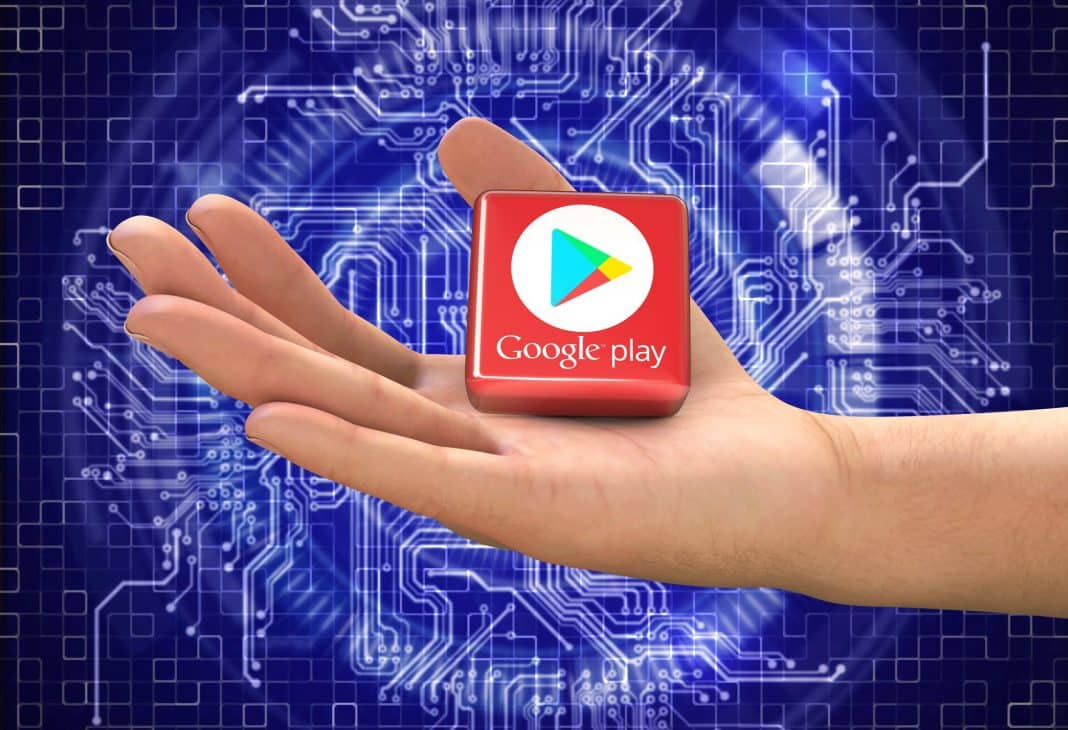Voraussichtliche Lesedauer: 11 minutes
Unleashing a seismic shift in the app ecosystem, Google Play’s policy update welcomes blockchain technology and non-fungible tokens (NFTs) into apps and games. This groundbreaking move opens up untapped frontiers, as developers and users alike prepare to explore the realm of digital assets. But what exactly does this policy revision mean for the world of apps and games? And how might this disruptive force of blockchain and NFTs reshape our app experiences? This article delves deep into these intriguing questions, illuminating the path that lies ahead.
Table of Content
- Breaking Down the Blockchain Barrier: Google Play’s policy update
- Blockchain and NFTs: Reshaping the App Ecosystem
- Addressing the Growing Interest in NFTs
- Fostering Transparency: A Fundamental Requirement
- Engaging with Developers: A Collaborative Effort
- Looking Ahead: What Does the Future Hold?
- Striking a Balance
Breaking Down the Blockchain Barrier: Google Play’s policy update
Google Play’s policy Update paves the way for app and game developers to incorporate blockchain technology and NFTs in their Games and apps. These innovative technologies could potentially transform how apps and game’s function, adding a whole new dimension to user experiences. However, this revolutionary integration comes with its own set of challenges and implications.
Developers aiming to include blockchain-based content or NFTs in their apps need to adhere strictly to Google’s guidelines. They are required to maintain transparency, declaring any blockchain-based elements in the Play Console. This approach demands a balance between innovation and user safety, a cornerstone of Google’s policy.
77% of retail CFD accounts lose money. Cryptoassets are a highly volatile, unregulated investment product without EU investor protection. Your capital is at risk
For instance, Google Play’s existing Real-Money Gambling, Games, and Contests policy and application process will apply to blockchain-based content, like gambling apps that feature NFTs. This means developers cannot glamorize potential earnings from trading or playing activities. Apps that do not meet gambling eligibility requirements cannot offer purchases where the value of the NFT users receive is unclear at the time of purchase. Such strategies aim to protect users from potential scams while ensuring responsible usage of blockchain technology.
Our discussion on the impact of tokenized digital assets on games may pique your interest in play-to-earn games. Dive deeper into the world of P2E games, their potential, and the future they’re shaping for the gaming industry in our specialized article.
Blockchain and NFTs: Reshaping the App Ecosystem
Blockchain technology and NFTs bring enormous potential to the app ecosystem, from redefining the way transactions take place to the very essence of ownership in digital spaces. NFTs, in particular, are set to revolutionize in-app experiences, giving users the power to own, buy, sell, and earn unique digital assets. This could fundamentally change the gaming landscape, enabling user-owned content and unique in-game rewards. But what does this mean for developers? This shift implies a whole new level of creativity and innovation in designing app experiences, enabling a closer relationship between developers and users through the tokenized digital assets.
77% of retail CFD accounts lose money. Cryptoassets are a highly volatile, unregulated investment product without EU investor protection. Your capital is at risk
Google’s new policy underscores that NFTs bought by users should be consumed or used in the game to enhance a user’s experience or aid users in advancing the game. However, this new direction isn’t without its hurdles. Developers need to walk a fine line between integrating these technologies and ensuring that they don’t run afoul of the new guidelines and safety measures. This presents a novel challenge and one that could define the future of the app and gaming industry. But what does this mean for developers? This shift implies a whole new level of creativity and innovation in designing app experiences, enabling a closer relationship between developers and users through the tokenized digital assets.
While we’ve touched on the integration of blockchain into gaming, you might be curious about how cryptocurrencies like Bitcoin influence the gaming landscape. Explore the fascinating world of Bitcoin board games in our insightful piece.
Addressing the Growing Interest in NFTs
Joseph Mills, the group product manager for Google Play, shared in a statement that the move is a response to the burgeoning interest in NFTs and other tokenized digital assets. The shift started earlier this year when Google indicated the potential integration of these technologies into its platform. It is now working with Web3 game makers, such as Mythical Games, to make this a reality.
In the past, app stores like Apple, Google, and Steam prohibited developers from selling games featuring NFTs unless they had a substantial Web2 component. However, the recent Google Play’s policy update means blockchain games will now be accessible to a broader audience.
The revised policy also indicates that Google Play can still collect their 30% fee on transactions, as the Web2 and Web3 requirements are met. This shift will empower blockchain game companies that previously faced significant distribution challenges on the open web.
Considering the emphasis on NFTs in the recent Google Play update, you may want to learn more about NFT trading cards. Discover the top 10 NFT trading cards and their unique features in our dedicated article.
77% of retail CFD accounts lose money. Cryptoassets are a highly volatile, unregulated investment product without EU investor protection. Your capital is at risk
Fostering Transparency: A Fundamental Requirement
As part of the new policy, developers must clearly declare if an app or game sells or enables users to earn tokenized digital assets. Any promotion or glamorization of potential earnings from playing or trading activities is strictly prohibited. This mandate underscores Google’s commitment to maintaining user trust and ensuring responsible usage of blockchain technology.
The updated policy has influenced the marketing strategies of Web3 game companies. Following the crash in NFT prices and the onset of the “crypto winter,” the focus is now more on enjoyable gameplay, player ownership, and potential voting rights, rather than the speculative aspect of earning significant sums.
As per the new guidelines, tokenized assets are meant to enhance and enrich in-game experiences. However, Google Play emphasizes that maintaining user trust is paramount. To achieve this, the platform has set guidelines in line with Google Play’s Real-Money Gambling, Games, and Contests policy. According to these guidelines, apps that do not meet gambling eligibility requirements cannot accept money for a chance to win assets of unknown real-world monetary value, including NFTs.
The growth of free-to-play play-to-earn games (F2P P2E Games) is another exciting development in this arena. Find out more about these accessible and innovative gaming experiences in our thorough article.
Engaging with Developers: A Collaborative Effort
Google Play developed the new policy in close consultation with app and game developers. The platform aims to create a level playing field that fosters user trust and responsible usage of blockchain technology.
John Linden, CEO of Mythical Games, lauded the updated policy, stating, “We really appreciate Google’s partnership in this collaborative effort to bring about innovation in this space and move these new economies forward. We think these new policies are steps forward for both players and developers alike and will positively impact the adoption of new technology while also protecting consumers.”
Reddit also commended the policy change. Matt Williamson, senior engineering manager at Reddit, stated, “By setting clear guidelines, we can ensure that our users make informed decisions while enjoying immersive experiences.”
Google Play plans to fully roll out the policy to all developers later this year. It anticipates users will start seeing these in-app and game experiences from later this summer. The ownership of NFTs will unlock content in-app, regardless of whether a user bought the NFT through a Google Play app, or they already owned it.
77% of retail CFD accounts lose money. Cryptoassets are a highly volatile, unregulated investment product without EU investor protection. Your capital is at risk
Looking Ahead: What Does the Future Hold?
As Google Play charts its path towards this ground-breaking integration of blockchain and NFTs, the ramifications for the app ecosystem are enormous. Developers stand at the threshold of a new era, one that promises creativity and innovation on an unprecedented scale. However, they also face the challenges of navigating a complex set of guidelines and balancing user safety with progress.
For users, the advent of blockchain and NFTs promises more engaging and immersive experiences. Yet, they too must tread carefully, aware of the potential risks and scams associated with these novel technologies. All in all, as we stand on the cusp of this exciting revolution, the opportunities and challenges ahead promise a vibrant and dynamic future for the app and gaming industry.
Striking a Balance
Google Play’s policy update moves to embrace blockchain technology and NFTs signifies a significant shift in the app and gaming industry. As we navigate this new landscape, it’s essential to keep abreast of these developments and understand their implications. Google Play’s policy update marks a positive shift for developers aiming to create engaging and immersive experiences through blockchain technology. As technology continues to evolve, it is vital for platforms like Google Play to promote innovation while maintaining user trust and safety.
These changes indicate the onset of a new era in the app ecosystem, emphasizing the vital balance between progress and user safety. As we move forward, the integration of blockchain technology and NFTs promises a vibrant and dynamic future for the app and gaming industry. As the integration of these technologies continues to unfold, one thing is clear: we are witnessing the dawn of a new era in the app ecosystem.
Join us as we explore this exciting journey and stay tuned for more updates on Google Play’s integration of blockchain and NFTs in apps and games. If you’re intrigued by the intersection of blockchain technology and gaming mentioned in this article, you might be interested in our detailed analysis and predictions about Gala Games. Find out why you should consider buying Gala Games in our comprehensive guide.
77% of retail CFD accounts lose money. Cryptoassets are a highly volatile, unregulated investment product without EU investor protection. Your capital is at risk




